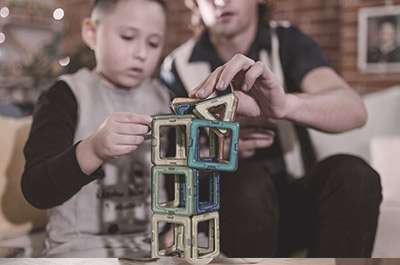Kids need time to let loose and have fun during playtime at preschool or simply running around outside. Playtime is essential for kids because it allows them to explore their world, develop new skills, and socialize with other kids. Here are just a few of the benefits of playtime for kids.
Playtime Promotes Physical Development.
Kids need time to let loose and have fun, so it’s no surprise that one of the most well-known benefits of playtime is its ability to promote physical development in children. However, there’s more to the story than just the obvious – many parents aren’t aware of all the great things that can happen when their child gets some playtime each day.

One of the ways that physical development is promoted through playtime is through built-in exercise. Since kids are “playing” when they’re running around, swinging on monkey bars, and playing tag with their friends, they’ll naturally incorporate exercise into their playtime. And the activity doesn’t need to be vigorous – something as simple as running around with a friend could provide them with some needed exercise.
Another way that playtime promotes physical development is through kids’ ability to use their imaginations while they’re playing. Whether it’s pretending to be a fireman or imagining that they’re on an adventure to find treasure, kids’ imaginations are put to good use while they play. Kids can pretend to be any number of things and can make-believe about many different scenarios – all while exercising their imagination.
Playtime Promotes Social Development.
Although some kids might prefer playing on their own, most kids prefer the company of other kids while they’re playing. Luckily, playing with friends is beneficial for your child – socialization is one of the most important benefits of playtime for kids 1.
The opportunities to develop new relationships are one of the best benefits of playtime for kids. When your child gets some time to play with other children, they’ll have the chance to learn how to interact with them and will have the opportunity to make new friends. And, if your child hasn’t made any friends at school, it’s a great time to get out there and meet some new friends.
Kids learn how to resolve conflicts on their own.
Kids learn how to get along and compromise when playing with other kids. In addition to helping your child develop relationships with other kids, playtime is crucial because it’ll help kids learn how to resolve conflicts independently. When your child is playing with other children, there’s a good chance that a conflict will come up. Since your child is spending so much time around other kids, they’ll need to know how to resolve disputes on their own – without any help from you.
Compromise is one of the best benefits of playtime for kids, mainly because it can be carried into school and home life. The ability to resolve conflicts is an important skill that can help kids get ahead in the classroom and at home, and playtime will help them learn how to do it.
Playtime Promotes Cognitive Development.
Not only is playtime important for physical and social development, but it’s also vital for cognitive development. Kids might not realize it, but they’ll be using their minds and thinking critically while they play.

While kids are playing, they’re using their brains and thinking about how they can move the game along.
Playing games that involve strategies, such as board games and card games, can be a great way to exercise your child’s brain. And when kids play games that involve building something or solving a problem, they’ll be flexing their cognitive muscles and developing critical thinking skills.
When kids play with friends, they’re also developing their cognitive skills. Since kids use their senses to figure out how the game is played and by whom, they’ll exercise their minds and think critically to figure out the rules. In addition, kids will be using cognitive skills when interacting with other children during playtime.
Playtime Promotes Fine Motor Development.
Along with physical and cognitive development, playtime is also important for fine motor development – the small movements that kids make, such as using their hands and fingers. While kids are playing, they might be building with blocks or constructing a card house – and they’ll need to use their hands and fingers the whole time.
For example, when kids play with blocks, they strengthen their fine motor skills.
Playtime is essential for fine motor development because it allows kids to put their fine motor skills into action. Kids might not realize it, but they’ll be using their hands and fingers while they’re playing with toys or games.
Playtime Enhances Creativity in Kids.
Creativity is vital for kids’ development, and it’s one of the best benefits of playtime for kids. Playtime can also help your child tap into their creative side – even growth because it allows them to express themselves and explore their imaginations. When kids play, there’s a good chance that they’ll come up with new ideas and figure out how to use their materials.
While kids are playing, they’re using their creativity and imagination.
When kids are playing, they’ll often develop new ideas and use their imaginations to think of new ways to play. Whether kids are building with blocks or running around the house pretending to be animals, they’re using their imagination and tapping into their creative side.
Playtime Helps Kids Understand Social Situations.

Another of the many benefits of playtime for kids is that it helps them understand social situations. Since kids spend time with other children, they’ll need to learn to socialize and interact with their peers.
While kids are playing, they learn about the rules of society and how to interact with other children. They’re figuring out how the world works by learning about the rules of society.
For example, kids might learn that it’s not okay to take someone else’s toy or that they need to share. When kids play with other kids, they learn how to act in social situations, and they’ll begin to understand what is considered polite behavior.
When kids play, they learn about social situations and develop their social skills. Since kids are engaging with other children during playtime, they’ll be learning how to interact with others and figuring out how their actions affect those around them. Kids might even learn how to be good friends from their playtime experiences.
Playtime Promotes Healthier Eating Habits.
Since kids will need to be active when playing, you can expect that playtime might also help your child eat healthier foods. Kids who are burning calories during playtime might be less likely to reach for potato chips and chocolate bars.
As kids engage with others during playtime, they might be more likely to make healthier food choices.
While kids are playing, they’re burning calories and exercising their bodies – which means that they’ll be less likely to reach for junk food or candy. When kids burn calories while playing, they might not need to eat as much – which means that their eating habits might improve.
Playtime Encourages Healthy Sleep.
Research suggests that playtime is also good for kids’ sleep. While kids are playing, they might not need as much sleep as if they were relaxing, which means that it will be easier for them to get to sleep at the end of the day.
Playtime can be restful for kids, making it easier to fall asleep.
While kids are playing, they might not need as much sleep as if they were relaxing – which means that it will be easier for them to get the rest that they need at night. On the other hand, kids might find that playtime helps them relax – which means that it can be restful and help them fall asleep.
Playtime is Good for Kids’ Stress Levels
Another benefit of playtime for kids is that it’s good for their stress levels. Since playtime provides kids with an opportunity to let off steam, they’ll have an easier time coping with stress. Many kids find that playtime is a calming experience.

Stress is dangerous for kids, meaning playtime will have an even more important benefit of stress reduction. Since playtime is a way for kids to relax and have fun, they’ll be able to reduce their stress levels by playing.
When kids play with others, they learn to resolve conflicts and deal with disagreements.
For example, if two kids are playing with the same toy, you can expect that they’ll need to learn how to resolve the situation – whether it means figuring out a way for both kids to play with the toy or whether one of the kids will need to find something else to play with.
Playtime is a way for kids to let out their emotions, it can be a way for them to have fun, or it can be a way for them to relax. These are all important benefits of playtime for kids, which help them cope with stress.
Conclusion.
Playtime is an essential part of a child’s development. It allows children to build their imagination, talent, and social skills.
We hope you enjoyed reading this blog post on the benefits of playtime for kids. If any questions or thoughts came up as you read, please leave them in the comments section below!

Dive into the insights of Matthew Mansour, a seasoned life coach, fitness guru, and health mentor. With a portfolio boasting over 800 thought-provoking articles, Matthew is passionate about unraveling the intricate layers of the human psyche. His reading choices? Books that shed light on our unique human journey, helping him (and his readers) harness the power of the mind, transforming challenges into stepping stones.
Matthew proudly wears his badge as a self-help aficionado. His mantra? There’s always room to grow, learn, and be inspired. He thrives on gleaning wisdom from pioneers, turning their experiences into valuable lessons for all.
Always on the pulse of emerging trends, Matthew immerses himself in groundbreaking courses and research centered around life coaching and holistic health. Eager to impart his knowledge, he’s here to guide anyone keen on enhancing their life journey.
Beyond his professional persona, Matthew is a devoted animal lover, a proud New Jersey resident, and a doting husband and father. Dive into his self-improvement blog and let Matthew guide you towards a life filled with purpose and passion!
Reviewed By: Joanna Perez and Marcella Raskin
Edited By: Lenny Terra
Fact Checked By: Gabrielle J. Smith
Photos Taken or Curated By: Matthew Mansour